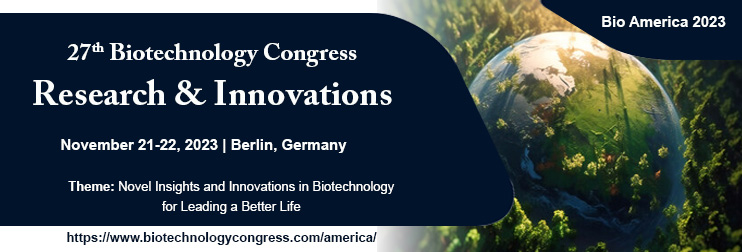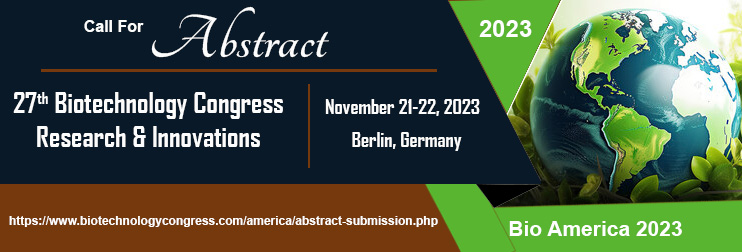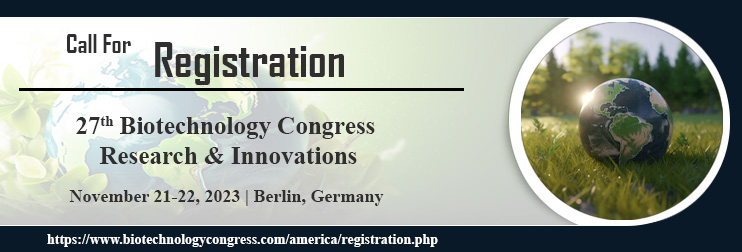Bio America 2023
Conferenceseries LLC LTD invites the contributors across the globe to participate in the premier “27th Biotechnology Congress” (Biotechnology Congress-2023), to discuss the theme: “Novel Insights and Innovations in Biotechnology for Leading a Better Life”. The conference will be held in Berlin, Germany, during November 21-22, 2023 wherein prompt keynote presentations, Oral talks, Poster presentations and Exhibitions are included. International conference of Bio America 2023 is a Research-scientific knowledge bridge that aims bring together multi-disciplinary luminaries for Thriving innovation in the Biotechnology. The scientific conferences have been carefully structured so as to share knowledge and thoughts through presentations and exhibitions. Bio America 2023 event with sessions covers all aspects of biotech-driven techniques such as CRISPR, synthetically engineered T Cells for Immunotherapy, Mutagenesis techniques and computational design tools for protein design and engineering, aging and neuroscience and addresses the key issues currently affecting these researches. Attendees can look forward to hearing about the different strategies taken to improve ongoing research and decipher how to overcome technical limitations in research development. This conference is where pharm, investors and Life Science companies find partners, access innovation, find funding and brainstorm the solutions to further their business needs.
Importance and scope:
Biotechnology is multi-disciplinary subject which use of living organisms and Engineering principles to develop or make products, or "any technological application that uses biological systems, living organisms, or derivatives thereof, to make or modify products or processes for specific use" (UN Convention on Biological Diversity, Art. 2). Biotechnology has applications in industrial areas, including health care (medical), Bio pharmaceutical industries, crop production and agriculture, nonfood (industrial) uses of crops and other products (e.g. vegetable oil, biofuels), and environmental uses. Growing demand for food for increasing population, ever increasing vaccination demand for people with affordable cost, solving inherited genetic diseases, to decrease global temperature by using bio-fertilizers which non emitting GHGs, leading life of the people with better life, can achieve with the help of biotechnology. So scope of biotechnology is very wide and it touches the every walk of life. By considering potentiality of growing technology in down-stream and up-stream processing in biopharma, genetic engineering, Tissue and protein engineering, fermentation technology and relevant fields, the sharing of thoughts and brain storming is necessary for contemporary developments in biotechnology research.
Target Audience:
Target Audience for Biotechnology congress will be personnel from both industrial and academic fields which include; Directors/Managers, Head of Departmental, Presidents/Vice Presidents, CEO, Professors, Associate and Assistant professors, Research Scholars and students from the related fields.
Target Audience
Industry 40%
Academia 50%
Others 10%
Major Biotechnology Associations around the Globe:
American Society for Biochemistry and Molecular Biology ·
American Society of Gene Therapy ·
European Federation of Biotechnology ·
American Genetic Association ·
Biotechnology and Biological Research Council (UK) ·
European Association of Pharma Biotechnology
Session & Tracks
Track 01: Medicine & Biotechnology
From manipulation of mutant genes to enhanced resistance to disease, biotechnology has allowed advances in medicine. Biotechnology is used in medicinal field such as Pharmacogenomics, Genetic Diagnosis and Gene Therapy. The study of pharmacogenomics can result in the development of tailor-made vaccines for people, more accurate means of determining drug dosages, improvements in drug discovery and approval, and the development of safer vaccines. Modern biotechnology can be used to manufacture drugs more easily and cheaply, as they can be produced in larger quantities from existing genetic sources. Genetic diagnosis involves the process of testing for suspected genetic defects before administering treatment through genetic testing. In gene therapy, a good gene is introduced at a random location in the genome to aid the cure of a disease that is caused by a mutated gene.
Track 02: Biomedical Engineering and Bio-Engineering
Biomedical engineering is the multydisplinary subject which uses engineering principles and techniques to the medical field. This field seeks to close the gap between engineering and medicine. It combines the Principles and problem solving skills of engineering with medical and biological sciences to improve healthcare diagnosis and treatment. This is evident throughout healthcare, from diagnosis and analysis to treatment, care, and recovery, and has entered the public domain though the multiplication of implantable medical devices, such as pacemakers and artificial hips, to more state of the art technologies such as stem cell engineering and the 3-D printing of biological organs. Biomedical engineering focuses on the advances that improve human health and health care at all levels. There are potentialities in industry for innovating, designing, and developing new technologies; in academia furthering research and pushing the frontiers of what is medically possible as well as implementing, testing and developing new diagnostic tools and medical equipment; and in government for establishing safety standards for medical devices.
Pharmaceutical biotechnology is a comparatively new and growing field in which the principles of biotechnology are applied to the designing and production of drugs. Pharmaceutical companies manufacture and market drugs, livestock feed supplements, vitamins, and a host of other products. Consistently, Pharmaceutical companies are one of the most profitable industries in the U.S. with sales exceeding $320 billion per year. The Biotechnology industry uses modern technologies in genetics research to develop products for human diseases, includes companies engaged in drug discovery and research, production and biologically engineered food production. Biotech opportunities largely mirror those in the pharmaceutical industry yet this industry is still in its’ infancy stage developmentally. A majority of therapeutic drugs in the current market are bio formulations, such as antibodies, nucleic acid products and vaccines. Such bio formulations are developed through several stages that include: understanding the principles involved in health and disease; the fundamental molecular mechanisms governing the function of related biomolecules; production and purification of the molecules; determining the product shelf life, stability, toxicity and immunogenicity; drug delivery systems; patenting; and clinical trials. The future of bio-pharmaceuticals belongs to protein based therapeutics. Designing stable and effective therapeutic proteins requires knowledge of protein structure and the interactions that stabilize the structure necessary for function.
Genetic engineering is the manipulation of an organism's genome using biotechnology Principles. It is a set of technologies used to change the genetic makeup of cells, including the transfer of genes within and across species domains for the production of improved or novel organisms. Genetic engineering has applications in medicine, research, industry and agriculture and can be used on a wide range of plants, animals and microorganisms. Tissue engineering is the use of a integration of cells, engineering and materials principles, and suitable biochemical and physicochemical factors to improve or replace biological tissues. It involves the use of a scaffold for the formation of new viable tissue for a medical purpose. Tissue engineering covers a broad range of applications, that repair or replace portions of or whole tissues (i.e., bone, cartilage, blood vessels, bladder, skin, muscle etc.). The definition of regenerative medicine is often used same sense with tissue engineering, although those involved in regenerative medicine place more emphasis on the use of stem cells or progenitor cells to produce tissues.
Protein engineering is the synthesis proteins by manipulation of structure and process of developing useful or valuable proteins. It is a new discipline, with much research taking place into the understanding of protein folding, structure and recognition for protein design principles. In the future, more detailed knowledge of protein structure, folding and function, as well as advancements in modern technology, may greatly expand the potentiality of protein engineering. Eventually, even unnatural amino acids may be incorporated, owning to a new method that allows the inclusion of novel amino acids in the genetic code. Proteins have important role in physiological processes and they are involved in movement, recognition, catalysis, regulation etc. Moreover, proteins also have several therapeutically and industrial applications. Enzyme engineering is the modifying an enzyme's structure (and, thus, its function) or modifying the catalytic activity of enzymes to produce new metabolites, to allow new (catalyzed) pathways for reactions to occur, or to convert certain compounds into others (biotransformation). These products are useful as chemicals, pharmaceuticals, fuel, food industries, or agricultural additives. In the future, enzymes may be restructured to fit more appropriately into industrial processes for the production of desired metabolites.
Nano biotechnology is the multidisciplinary subject which combines engineering principles and molecular biology. Nano biotechnology has the potentiality to create biological and biochemical materials and devices at molecular and atomic levels. It presents new class of multifunctional systems and devices for biological analysis with better sensitivity and much specificity. Nano biotechnology subsumes the application of the tools and processes of nanotechnology to control biological systems. The Nano biotechnology includes new techniques such as 3D imaging in live cells, real-time imaging, and single molecule imaging bioanalytical microarrays and biosensors and microfluidic devices. This discipline helps to indicate the subsume of biological research with various fields of nanotechnology. Concepts that are enhanced through Nano biology comprises: Nano devices (such as biological machines), nanoparticles, and nanoscale phenomena that available within the discipline of nanotechnology. This technical approach to biology allows scientists to envisage and create systems that can be used for biological research. Biologically inspired nanotechnology uses biological systems as the encourisation for technologies not yet created. However, as with nanotechnology and biotechnology, bio nanotechnology does have many potential ethical issues associated with it.
Track 07: Plant, Agriculture and Environment Biotechnology
Agricultural biotechnology, also known as aggrotech, is an area of agricultural science involving the use of scientific tools and techniques, including genetic engineering, molecular markers, molecular diagnostics, vaccines, and tissue culture, to modify living organisms: plants, animals, and microorganisms. Biotechnology is used in many ways in agriculture. Agricultural biotechnology companies work to supply farmers with tools to increase the yield of plant and animal products, while lowering the costs of production. Agricultural biotechnology can also include production of plants such as orchids for ornamental purposes and plants that can be used for fuel production (biofuels). To accomplish these goals, biotechnologists develop products to protect animals and crops from disease and help farmers identify the best animals and seeds to use in selective breeding programs. Environmental biotechnology is a system of scientific and engineering knowledge related to the use of microorganisms and their products in the prevention of environmental pollution through bio treatment of solid, liquid, and gaseous wastes, bioremediation of polluted environments, and biomonitoring of environment and treatment processes. The International Society for Environmental Biotechnology defines environmental biotechnology as "the development, use and regulation of biological systems for remediation of contaminated environments (land, air, water), and for environment-friendly processes (green manufacturing technologies and sustainable development)". Science through the IAASTD has called for the advancement of small-scale agro-ecological farming systems and technology in order to achieve food security, climate change mitigation, climate change adaptation and the realization of the Millennium Development Goals. Environmental biotechnology has been shown to play a significant role in agroecology in the form of zero waste agriculture and most significantly through the operation of over 15 million biogas digesters worldwide.
The ocean has the oldest, most diverse, most numerous and least studied organisms on earth. It covers almost three fourths of our planet and has the potential to feed the world and supply cures for many diseases. Studying sea plants and animals is a challenge that is becoming easier due to advanced technologies such as deep-sea submersibles, sonar, lasers, videos, and satellites. Biotechnology contributes to current or potential uses of marine products in the areas of: Aquaculture, Conservation of marine ecosystems Therapeutics/medicines, Aquatic animal health and seafood safety, Biomedical research Algae cultivation. Marine Biotechnology is a relatively new field of study, having emerged in the past few years. It began in 1998 when scientists from the Scripps Institution of Oceanography and various departments of the University of California, San Diego, came together and formed the Center for Marine Biotechnology and Biomedicine. The Specialty Marine Biotechnology is intended to host scientific contributions in marine science that are based on the enormous biodiversity of marine ecosystems and the genetic uniqueness of marine organisms to develop useful products and applications. Marine Biotechnology is the study of how the various organisms and actions of the ocean can be used to provide services and products to us. Marine Biotechnology is the use of living marine resources at (eco) system, concept, organism or molecular level to provide beneficial solutions for the society. Scientists in this field of Marine Biotechnology are studying the various enzymes and proteins of marine life in hopes of solving many problems that plague the area of Agriculture and Industry today. These problems include trying to find anti-corrosive coatings and "self-cleaning" surfaces for industrial use.
Food biotechnology is the application of technology to modify genes of animals, plants, and microorganisms to create new species which have desired production, marketing, or nutrition related properties. Genetically engineered (GE) or genetically modified (GM) foods, they are a source of an unresolved controversy over the uncertainty of their long-term effects on humans and food chains. Food biotechnology is and will continue to be an important area in science as the world’s human population continues to increase and the world’s agricultural lands continue to decrease. Food biotechnology employs the tools of modern genetics to enhance beneficial traits of plants, animals, and microorganisms for food production. It involves adding or extracting select genes to achieve desired traits. Food biotechnology offers the potential to further improve our nation’s health and the health of developing nations. The work currently being done with “golden rice” and the potential it has to help combat hunger and malnutrition related diseases. Purchase fruits and vegetables with increased antioxidant content that may reduce risk for cancer. Plant-made pharmaceuticals are the latest evolution within the realm of biotechnology. As the name suggests, this process uses genetics to enable plants to produce protein-based medicines to treat diseases and save lives. These proteins are extracted from the plant and developed into pharmaceuticals. Edible vaccines are among the most innovative approaches for administering new vaccines. For example, researchers have investigated putting a vaccine into bananas that would protect against food borne pathogens.
Animal biotechnology is a branch of biotechnology in which molecular biology techniques are used to genetically engineer (i.e. modify the genome of) animals in order to improve their suitability for pharmaceutical, agricultural or industrial applications. Animal biotechnology has been used to produce genetically modified animals that synthesize therapeutic proteins, have improved growth rates or are resistant to disease. Animal health and efficiency in generating animal based products with a target to increase quantity as well as quality of such products is the ultimate motive behind scientific research. Animal biotechnology is the use of science and engineering to modify living organisms. The goal is to make products, to improve animals and to develop microorganisms for specific agricultural uses. Examples of animal biotechnology include creating transgenic animals (animals with one or more genes introduced by human intervention), using gene knock out technology to make animals with a specific inactivated gene and producing nearly identical animals by somatic cell nuclear transfer (or cloning). Animal biotechnology in use today is based on the science of genetic engineering. Under the umbrella of genetic engineering exist other technologies, such as transgenic and cloning, that also are used in animal biotechnology. The potential benefits of animal biotechnology are numerous and include enhanced nutritional content of food for human consumption a more abundant, cheaper and varied food supply; agricultural land-use savings; a decrease in the number of animals needed for the food supply; improved health of animals and humans; development of new, low-cost disease treatments for humans; and increased understanding of human disease.
Bioinformatics is an interdisciplinary field that develops methods and software tools for understanding biological data. As an interdisciplinary field of science, bioinformatics combines computer science, statistics, mathematics, and engineering to analyze and interpret biological data. Bioinformatics has been used for in silico analyses of biological queries using mathematical and statistical techniques. "All aspects of gathering, storing, handling, analyzing, interpreting and spreading vast amounts of biological information in databases”. The information involved includes gene sequences, biological activity/function, pharmacological activity, biological structure, molecular structure, protein-protein interactions, and gene expression. Bioinformatics uses powerful computers and statistical techniques to accomplish research objectives, for example, to discover a new pharmaceutical or herbicide." Deals with the computational management and analysis of biological information: genes, genomes, proteins, cells, ecological systems, medical information, robots, artificial intelligence. Areas of current and future development of bioinformatics are Molecular biology and genetics, Phylogenetic and evolutionary sciences, different aspects of biotechnology including pharmaceutical and microbiological industries, Medicine, Agriculture, and Eco-management.
Track 12: Industrial and Microbial Biotechnology
Industrial biotechnology is a set of practices that use living cells (such as bacteria, yeast, algae) or component of cells like enzymes, to generate industrial products and processes. Industrial biotechnology can be used to: Create new products, such as plant-based biodegradable plastics; Replace petroleum-based feedstocks by processing biomass in bio refineries to produce electricity, transport fuels or chemicals; Modify and develop new industrial processes, such as by using enzymes to reduce the amount of harsh chemicals used the textile or pulp and paper industries; Reduce the environmental impact of manufacturing; for example by treating industrial wastewater onsite using biological mediums such as microbes; Industrial biotechnology is one of the most promising new approaches to pollution prevention, resource conservation, and cost reduction. It is often referred to as the third wave in biotechnology. If developed to its full potential, industrial biotechnology may have a larger impact on the world than health care and agricultural biotechnology. It offers businesses a way to reduce costs and create new markets while protecting the environment. Also, since many of its products do not require the lengthy review times that drug products must undergo, it's a quicker, easier pathway to the market. Today, new industrial processes can be taken from lab study to commercial application in two to five years, compared to up to a decade for drugs.
The applied biotechnology major deals with the scientific background and laboratory experience necessary for the biotechnology and pharmaceutical industries, or for advanced study in the applications of biotechnology and molecular biology for the use and improvement of plants, animals, and micro-organisms. In addition, it can be to prepare for professional programs in medicine. Multi discipline science of interest in chemistry, biotechnology, microbiology. This interdisciplinary major brings together areas of study such as animals, food science, forestry, entomology, and plants to improve the knowledge and skills necessary to use biotechnology for the improvement of plants, animals, and microorganisms. Gaining theoretical as well as hands-on knowledge in the areas of molecular biology, structural biology and biotechnology furthermore, studies in the areas of protein engineering, synthetic biology and molecular biotechnology for renewable energy. Thanks to the courses in project management, marketing and entrepreneurship, one will also gain insight into business management and learn how projects are planned and carried out in the biotechnology industry.
Biosafety as currently discussed in the International “Convention on Biological Diversity” (CBD) and designed to create internationally binding protocols on biosafety. The application of biotechnology to food and agriculture can bring not only potential risks and benefits as any technology can, but also concerns about the human dimensions coupled with biotechnology. These include both positive and negative impacts on stake holders, social institutions, economy and communities. Different areas associated with biosafety include: (i) Agriculture and food system issues (ii) Market and consumer issues (iii) Institutional issues, business issues and (iv) Social issues. Biosafety is the prevention of large-scale loss of biological integrity, focusing both on ecology and human health. These prevention mechanisms include conduction of regular reviews of the biosafety in laboratory settings, as well as strict guidelines to follow. The international Cartagena Protocol on deaBiosafety ls primarily with the agricultural definition but many advocacy groups seek to expand it to include post-genetic threats: new molecules, artificial life forms, and even robots which may compete directly in the natural food chain. ‘Biosafety’ means the need to protect human and animal health and environment from the possible adverse effects of the products of modern biotechnology. Bioethics is the study of the typically controversial ethical issues emerging from new situations and possibilities brought about by advances in biology and medicine. It is also moral discernment as it relates to medical policy and practice. Bioethicists are concerned with the ethical questions that arise in the relationships among life sciences, biotechnology, medicine, politics, law, and philosophy. The scope of bioethics can expand with biotechnology, including cloning, gene therapy, life extension, human genetic engineering, astroethics and life in space, and manipulation of basic biology through altered DNA, XNA and proteins. These developments will affect future evolution, and may require new principles that address life at its core, such as biotic ethics that values life itself at its basic biological processes and structures, and seeks their propagation.
Market analysis
A complete market research analysis including forecasts and market estimates technologies analysis and developments at innovative firms within the Biotech, Pharmaceuticals and Genetics Industry. Gain key insights that can help shape strategy for business development, product development and investments. In this area all businesses, research institutions and organizations that improve the quality of life of all organisms are taken into consideration. When it comes to human health it includes understanding diseases so mankind can benefit from the studies and research and fight against these health pandemics.

Biotechnology refers to the usage of biological processes and living organisms to change different products and services for a specific application. Biotechnology is employed in the agriculture sector for increasing genetically modified plants, improving pest resistance, enhancing crop herbicide tolerance and facilitating sustainable farming. Moreover, it is obtaining traction in wastewater treatment, chemical manufacturing, paper, textiles and food products, and reducing the environmental footprint of industrial processes and making them cleaner as well as more efficient.

Biotechnology based chemicals market size forecast by regions and countries from 2023 to 2027 of Biotechnology. It also provides an analysis of the volume of production about the global market and about each type from 2017 to 2027. It mentions the volume of production by region from 2017 to 2027. Pricing analysis is included in the report according to each type from the year 2017 to 2027, manufacturer from 2017 to 2023, region from 2017 to 2023 and global price from 2017 to 2027.

Past Conference Report
With the successful completion of our previous “26th Biotechnology Congress: Research & Innovations” held during June 16-17, 2022 a webinar focusing with the theme of “Recent Research and Invention in Food science and Biotechnology”.
By receiving howling and wondrous response from the speakers Conference Series is pleased to announce that “27th Biotechnology Congress: Research & Innovations” which is held during November 21-22, 2023 at Berlin, Germany. The event knowledgeable with the theme of “Novel Insights and Innovations in Biotechnology for Leading a Better Life”
Bio America 2023 will inspire scientists and researchers & young researchers in their early stage of career graph to widely discuss their outcome so as to improve and develop their ideas. The main aim of Bio America 2023 is to encourage students in taking active part in the International Science platform to sharpen their skills and knowledge.
We have come up with an idea of honoring the members with Best Keynote Speaker, Best Speaker, Best Masters/Ph.D./Postdoc Thesis work presentation, Best Poster Award.
We are also compelling to various delegate experts, company representatives and other eminent personalities who supported the conference by facilitating active discussion forums. We sincerely thank the Organizing Committee.
The Sponsor and Exhibitor in the Conference will get chance to expose themselves to new clients, customer, business, brand awareness and media exposure. Our sponsorship has categorized with Premium Sponsorship Packages: Elite Sponsor, Silver Sponsor, Gold Sponsor, Exhibition, Media Partner, Collaborator, Additional Sponsorship Packages and Advertisements.




